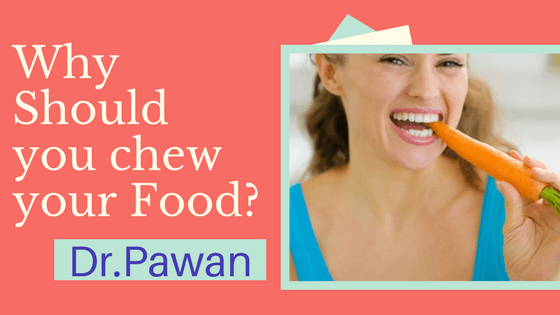
WHY SHOULD YOU CHEW YOUR FOOD
WHY SHOULD YOU CHEW YOUR FOOD?
My mom hates me when I eat in hurry, I guess this is same as everyone. As a youth, I never understood why would my mom asked me to eat slow, but as I’m what today, very well realize the importance of eating slow. For most of us eating, chewing, and digesting is all the same. And that is why I’m writing this.Digestion is not a simple process, neither is eating and chewing same, let me help you through.
Digestion is a complex, dynamic, crucial and very energy consuming activity that occurs involuntarily in the human body.
The sight, smell, taste, touch or even the thought of food can trigger our hunger & increase the production of digestive enzymes,gastric juices as well as increase saliva. Now,you know why we salivate!
The process of digestion begins in the mouth. Pre-digestion involves the process of chewing, which is technically referred to as mastication. Though chewing literally means to bite and munch food in the mouth with teeth for making it easy to swallow, a lot more things happen there during chewing.
The two main aspects of chewing:
- The physical aspect involves the constant crushing or grinding of food by teeth in order to break it into smaller pieces which enables it to enter the food pipe easily. The saliva a helps with softening the food as well as lubricating so that swallowing and movement of food is easier with lesser friction.
- The chemical aspect involves the excessive release of saliva. Saliva contains a lot of digestive enzymes that start the digestion of minor constituents in the mouth itself. Involvement of a number of body parts is necessary to facilitate the process of chewing.
The Jaws:
The upper jaw, which is called the maxilla, is fixed to the base of the skull, while the lower jaw is the one that actually moves to facilitate chewing.
Teeth are the key structures that enable chewing. They are like chisel and mallet or mortar and pestle and act as grinders.
Teeth are fixed into the jaws by means of a ligament which acts like a shock absorber to help teeth adjust and accommodate the high chewing force,and that is the reason why your tooth doesn’t break if you chew on tiny stones by mistake.
The muscles of mastication comprise of four basic muscle groups that help in chewing. They facilitate the various movements of the lower jaw.
Besides tasting, the tongue helps the food in the mouth during chewing and also helps it mix with the saliva and shape it into a bolus for swallowing.
The cheek and lips help keep the food in the mouth and within the confines of the grinding \ chewing zone.
The salivary glands produce saliva.
With the help of the sensory organs, the brain and the associated autonomous nervous system help coordinate all these activities, as they perceive food-related stimuli and stimulate as well as trigger digestive processes.
WHY SHOULD YOU CHEW YOUR FOOD ?
Proper chewing helps break down the size of the food particles so that the intestines can absorbs nutrients more efficiently and easily, as more surface area of the food comes into contact with the intestinal walls.
Proper chewing takes time. The longer we chew, the slower we eat. It takes approximately 20 minutes for ‘leptin’ _ the hunger-suppressing hormone, to get released to signal the brain towards a feeling of fullness.
Therefore, slow eating and proper chewing help reduce the quantity of food intake. This principle has been successfully employed as a part of weight loss regimen worldwide.
Chewing well also gives the muscles of mastication, tongue, mandibular joints, face as well as periodontal ligaments a good workout. This also helps in the functional development of these structures and improves dexterity.
Prolonged and thorough chewing increase the secretion of saliva, which has antibiotic properties that help keep a check on bacterial overgrowth.
The chewing process, especially food rich in fibre, causes the food to clean the tooth surface of sticky debris and other food particles, thereby preventing dental caries and formation of deposits and tartar, to a significant extent.
Enzymes in the saliva called peroxidases are known to neutralize carcinogens in the food and also help reduce the risk of cancer.
Taking time to chew properly enables the flavours to be experienced better and relished. This also helps sharpen the gustatory senses, giving it the ability to recognize and distinguish the wider ranges of flavours.
The British journal of psychology states that due to the increased brain activity during chewing, there is an increase in concentration and decrease in reaction time in people.

Nurturing of proper chewing habits
Proper chewing habits, patterns and durations can be habituated into our lifestyle with regular conscious practice.
Proper chewing involves:
- Taking smaller bites or portions at a time rather than stuffing larger portions into the mouth. Smaller portions can be more easily and efficiently chewed.
- A slow and steady pace of chewing.
- Practicing a balanced bilateral chewing pattern, wherein food is chewed on both sides rather than just on one side.
- Chewing until the food in the mouth is liquefied or has lost its texture. The number of times food is to be chewed various depending on the type of food. Softer foods take lesser time to chew, while harder and fibrous ones take longer.
- Completely chewing and swallowing the food in the mouth before taking the next bite.
- Chewing with the mouth closed will help reduce the chances of swallowing air. Besides, it is general to chew with the mouth closed.
- Waiting to drink fluids until the food is completely swallowed, rather than washing it down with water.
Chewing for no reason can be harmful
Though chewing is essential while eating, chewing without the intake of food can be harmful. While chewing, the body receives physical signals to initiate digestion and prepare for the incoming food. Enzymes and acids gets released but since there is no food to digest, there will be an imbalance and as a result, over a period of time, it can lead to acidity, peptic ulcers, acid reflux and also the under secretion of digestive secretions, when actually needed.
One example harmful chewing habit is can be chewing gum. Chewing gum can cause muscle imbalance when chewed on one side and even result in mandibular joint disorders. These can culminate in chronic painful conditions.
Difficulties in chewing
Teeth are instrumental in chewing whereas missing tooth can cause a great deal of discomfort while chewing. So, regular dental visits are very important. Misalignment of teeth can also impede proper chewing.
Conditions, such as mouth ulcers or soreness, due to vitamin deficiencies or necrotic diseases, can hamper proper chewing.
Conclusion
It is always good to consult your dentist, for any queries or clarifications, if you face discomfort or trouble in chewing.
If you need more details or information, you can visit us at the following address
Ramchandra’s Jussmile Dental Clinic,
1333/A,B1,Royal Castle Apartments,
7th cross street,
Poompuhar Nagar,Kolathur,
Chennai-99
To fix an appointment online – Click Here
You can also reach them through phone +91 9884336617 / +91 44 42802255, or email at info@jussmile.com


Leave a Reply